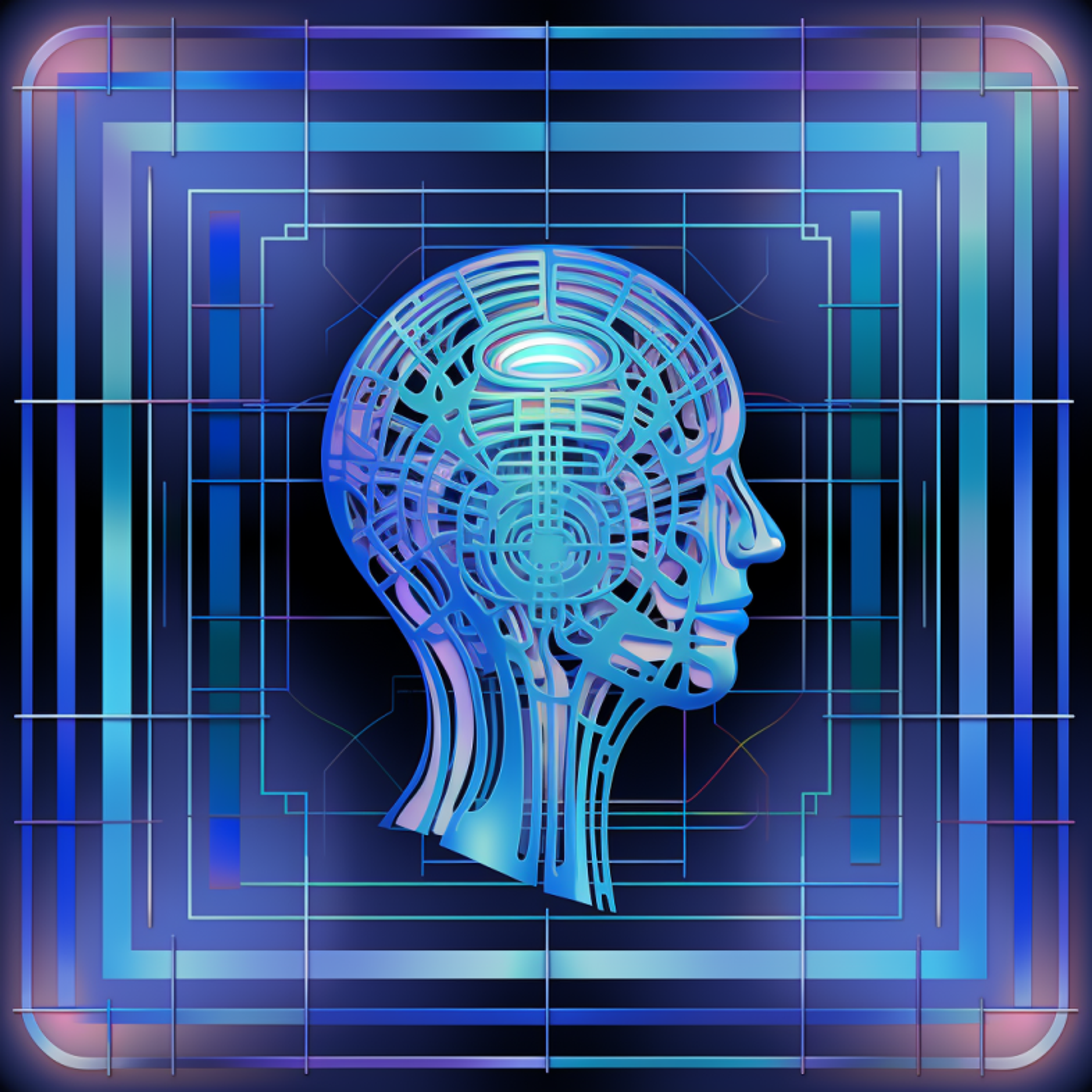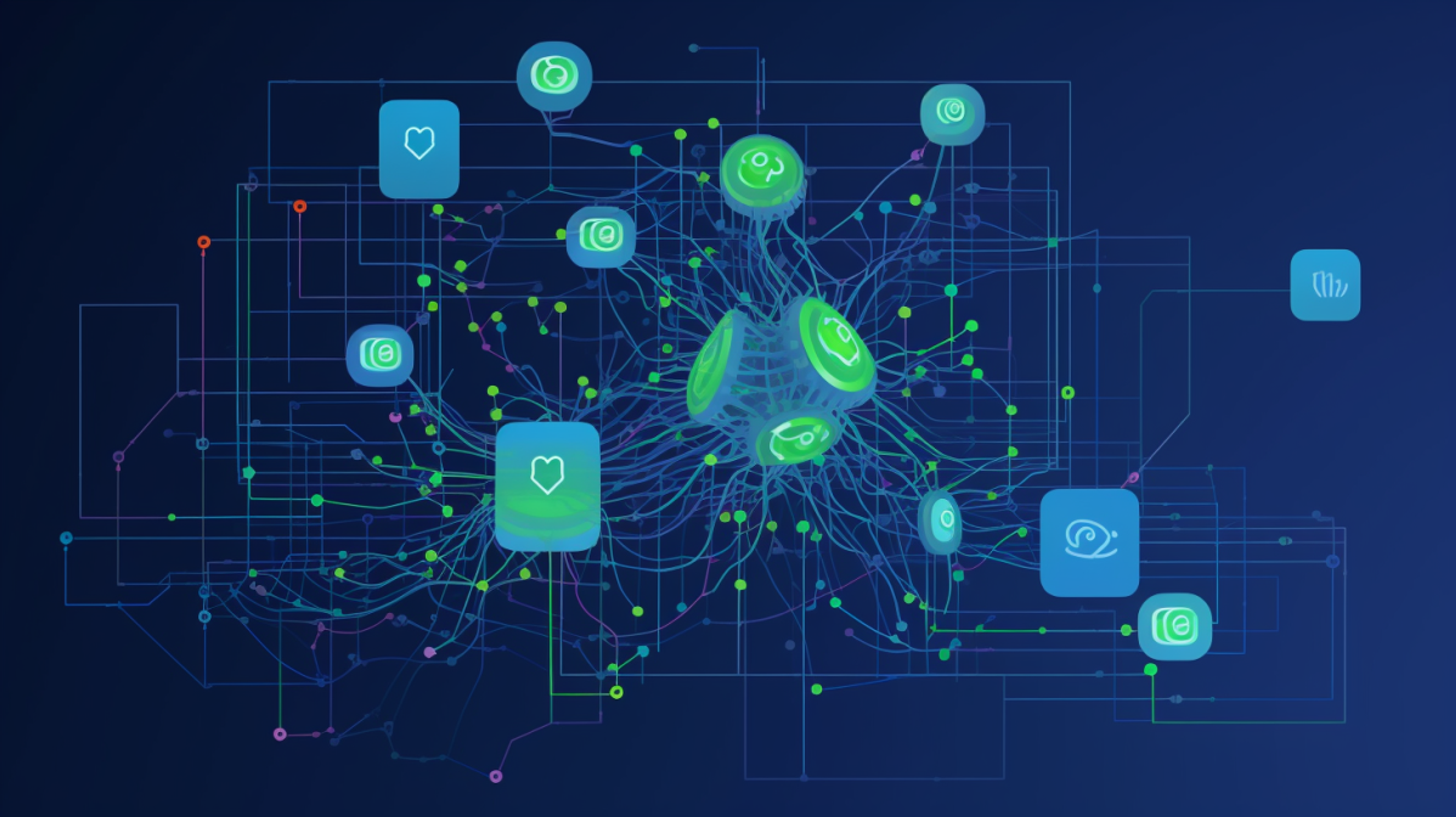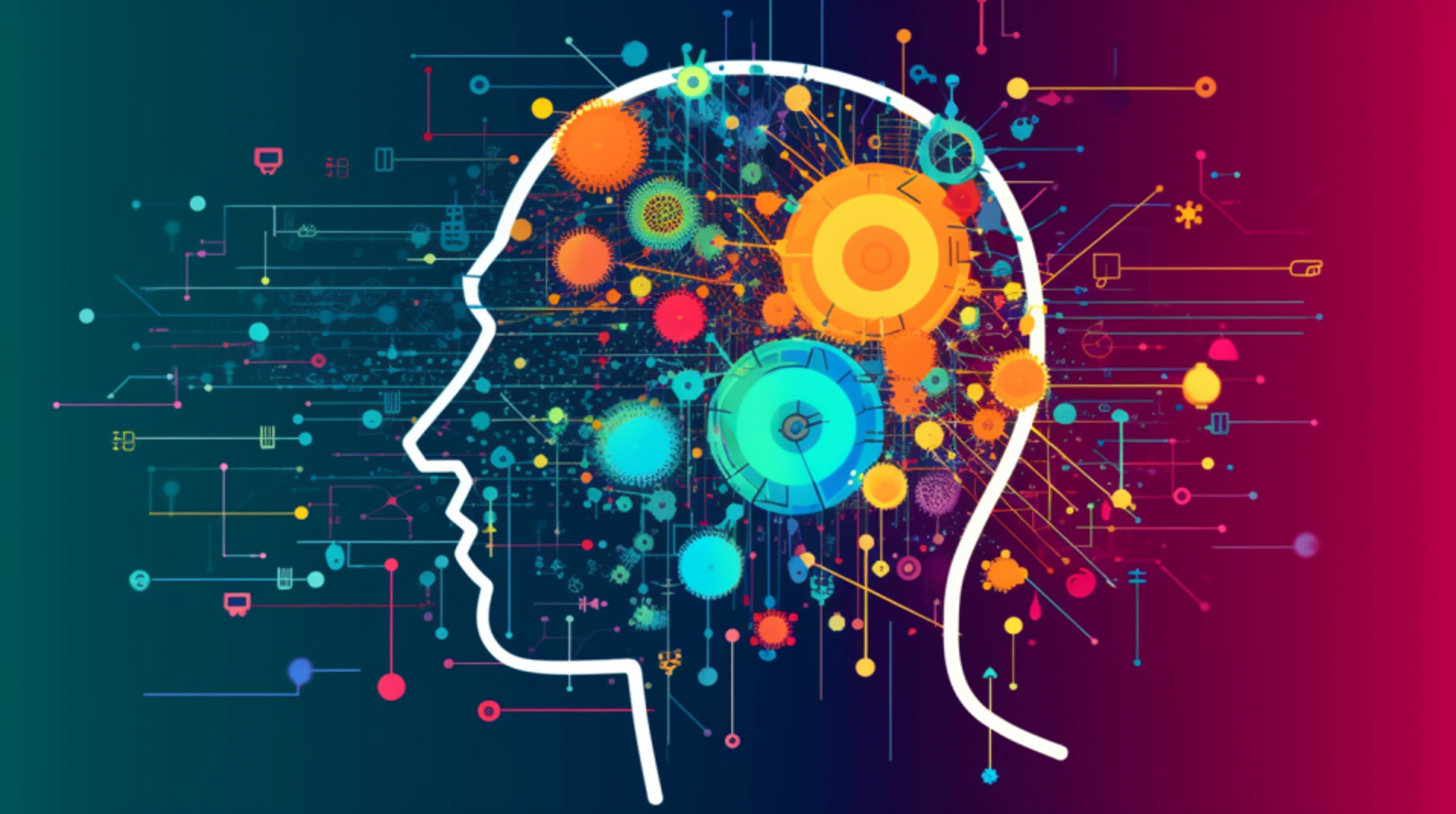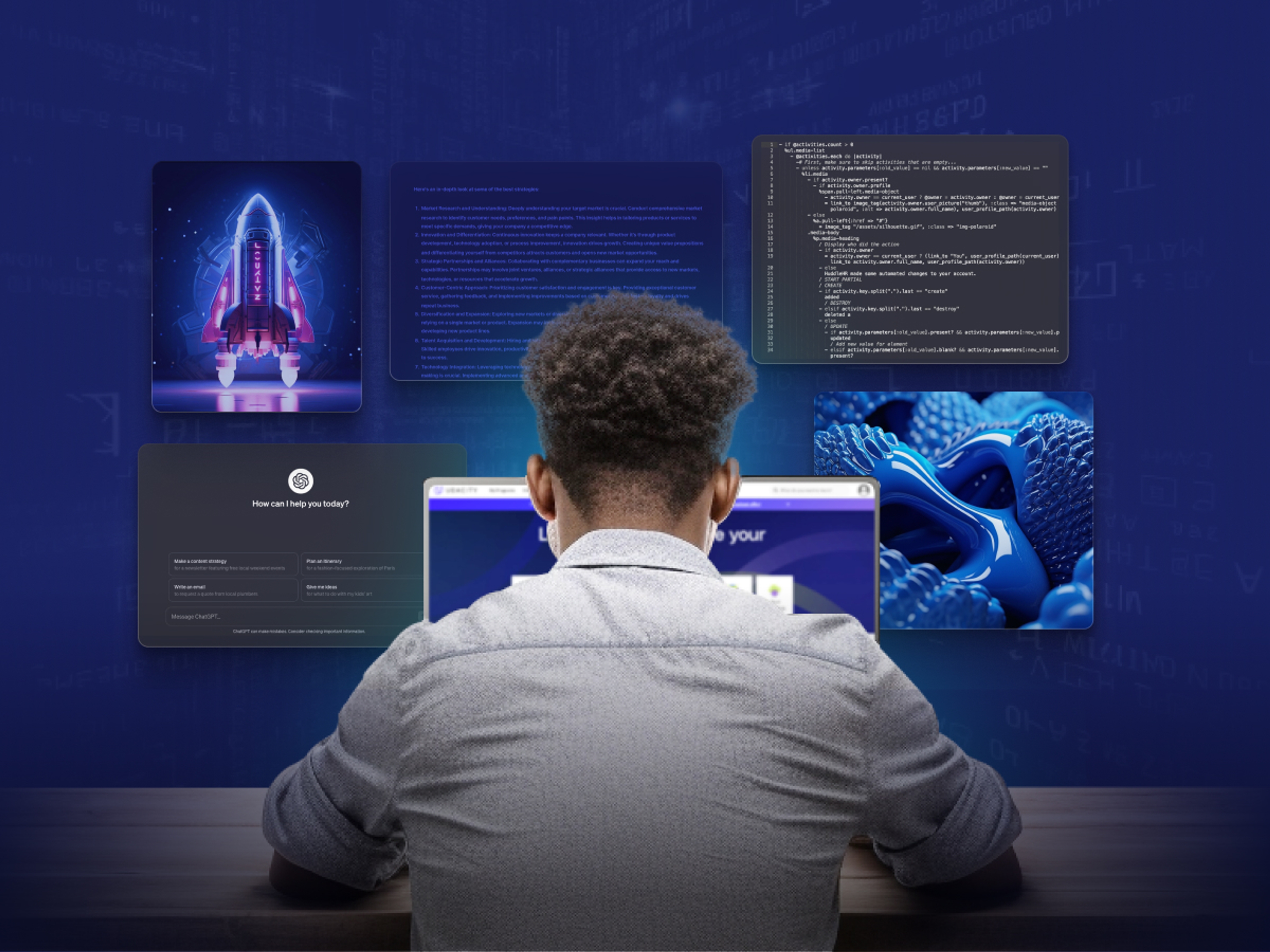Lesson 1

AI for Healthcare
Nanodegree Program
The AI for Healthcare program offers two courses that apply AI to 2D and 3D medical imaging data. The first course covers fundamental skills needed to work with 2D imaging data, such as extracting images from DICOM files, building AI models, and obtaining regulatory approval. The course project involves training a CNN to classify chest X-rays for the presence of pneumonia and writing an FDA validation plan. The second course covers 3D imaging data, including clinical fundamentals, imaging modalities, and common analysis tasks. It also explores how AI can be integrated into the clinical workflow. Both courses are designed to teach students how to derive clinically relevant insights from medical imaging data using AI.
The AI for Healthcare program offers two courses that apply AI to 2D and 3D medical imaging data. The first course covers fundamental skills needed to work with 2D imaging data, such as extracting images from DICOM files, building AI models, and obtaining regulatory approval. The course project involves training a CNN to classify chest X-rays for the presence of pneumonia and writing an FDA validation plan. The second course covers 3D imaging data, including clinical fundamentals, imaging modalities, and common analysis tasks. It also explores how AI can be integrated into the clinical workflow. Both courses are designed to teach students how to derive clinically relevant insights from medical imaging data using AI.
Advanced
3 months
Real-world Projects
Completion Certificate
Last Updated May 11, 2024
Courses In This Program
Course 1 • 30 minutes
Welcome to the AI for Healthcare Nanodegree Program
Lesson 1
AI for Healthcare Nanodegree Program Introduction
Course 2 • 3 weeks
Applying AI to 2D Medical Imaging Data
Lesson 1
Introduction to AI for 2D Medical Imaging
In this lesson, you will be given an introduction to this course about AI for 2D medical imaging, why AI is important and where AI fits in the space.
Lesson 2
Clinical Foundations of 2D Medical Imaging
In this lesson, we will cover clinical foundations such as clinical workflows, applications of 2D imaging in clinical settings and how machine learning impacts clinics.
Lesson 3
2D Medical Imaging Exploratory Data Analysis
In this lesson, we will learn the DICOM standard in medical imaging, and how to explore medical imaging data and prepare it for machine learning applications.
Lesson 4
Classification Models of 2D Medical Images
In this lesson, we'll dive deep into classification tasks for 2D medical imaging using different machine learning models. and we will talk about pre-process data, train, test, and validate models.
Lesson 5
Translating AI Algorithms for Clinical Settings with the FDA
In this lesson, you will learn about how your work fits into the bigger picture, and how it’s regulated by the FDA, which is an often-overlooked, but incredibly important.
Lesson 6 • Project
Project: Pneumonia Detection from Chest X-Rays
Course 3 • 3 weeks
Applying AI to 3D Medical Imaging Data
Lesson 1
Introduction to AI for 3D Medical Imaging
In this lesson, we will introduce the course and instructors. We will give you an overview of the context for AI in 3D medical imaging space, and cover the objectives of the course.
Lesson 2
3D Medical Imaging - Clinical Fundamentals
In this lesson, we cover the basic terminology and concepts related to 3D medical imaging. We will look at the problem space from a clinical standpoint and learn how CT and MR scanners produce images.
Lesson 3
3D Imaging Exploratory Data Analysis
In this lesson, we will dive deeper into medical imaging formats NIFTI and DICOM, how scanner data is represented, and how to read medical volumes stored in these files and analyze them.
Lesson 4
3D Medical Imaging - End-to-End Deep Learning Applications
In this lesson, we cover the basics of building deep neural networks for 3D medical imaging (mostly segmentation & classification) and performance evaluation from a software and clinical perspective.
Lesson 5
Deploying AI Algorithms in Real World Scenarios
In this lesson, we'll talk about clinical networks, architecture, and AI deployment, tools and their use by data scientists and clinicians, as well as medical device regulation and data privacy.
Lesson 6 • Project
Hippocampal Volume Quantification in Alzheimer's Progression
In this project, you will curate a dataset of brain MRIs, train a segmentation on a CNN, and integrate this into a clinical network to quantify hippocampal volume for Alzheimer's progression.
Course 4 • 3 weeks
Applying AI to EHR Data
With the transition to electronic health records (EHR) over the last decade, the amount of EHR data has increased exponentially, providing an incredible opportunity to unlock this data with AI to benefit the healthcare system. Learn the fundamental skills of working with EHR data in order to build and evaluate compliant, interpretable machine learning models that account for bias and uncertainty using cutting-edge libraries and tools including Tensorflow Probability, Aequitas, and Shapley. Understand the implications of key data privacy and security standards in healthcare. Apply industry code sets, transform datasets at different EHR data levels, and use Tensorflow to engineer features.
Lesson 1
Applying AI to EHR Data Introduction
This lesson will provide you with an Introduction to the EHR Data course outline, content, as well as introduce you to your instructor.
Lesson 2
EHR Data Security and Analysis
In this lesson, you will learn about the importance of data security and the different standards that apply to EHR, as well as analyzing EHR data.
Lesson 3
EHR Code Sets
In this lesson you will learn how to work with different EHR codes and how to map them properly to records.
Lesson 4
EHR Transformations & Feature Engineering
In this lesson, you'll gain skills in feature engineering and transformation of EHR.
Lesson 5
Building, Evaluating and Interpreting Models
In this final lesson, you'll be putting all of your skills together to build, evaluate and interpret ML models for Bias and Uncertainty.
Lesson 6 • Project
Project: Patient Selection for Diabetes Drug Testing
In this project students will use what they learn in the classroom to apply AI in healthcare for patient data.
Taught By The Best

Michael DAndrea
Principal Data Scientist at Genentech
Michael is on the Pharma Development Informatics team at Genentech (part of the Roche Group), where he works on improving clinical trials and developing safer, personalized treatments with clinical and EHR data. Previously, he was a Lead Data Scientist on the AI team at McKesson's Change Healthcare.

Ivan Tarapov
Sr. Program Manager at Microsoft Research
At Microsoft Research, Ivan works on robust auto-segmentation algorithms for MRI and CT images. He has worked with Physio-Control, Stryker, Medtronic, and Abbott, where he has helped develop external and internal cardiac defibrillators, insulin pumps, telemedicine, and medical imaging systems.

Mazen Zawaideh
Radiologist
Mazen Zawaideh is a Neuroradiology Fellow at the University of Washington, where he focuses on advanced diagnostic imaging and minimally invasive therapeutics. He also served as a Radiology Consultant for Microsoft Research for AI applications in oncologic imaging.

Nikhil Bikhchandani
Data Scientist at Verily Life Sciences
Nikhil Bikhchandani spent five years working with wearable devices at Google and Verily Life Sciences. His work with wearables spans many domains including cardiovascular disease, neurodegenerative diseases, and diabetes. Before Alphabet, he earned a B.S. and M.S. in EE and CS at Carnegie Mellon.

Emily Lindemer
Director of Data Science & Analytics at Wellframe
Emily is an expert in AI for both medical imaging and translational digital healthcare. She holds a PhD from Harvard-MIT's Health Sciences & Technology division and founded her own digital health company in the opioid space. She now runs the data science division of Wellframe.
Ratings & Reviews
Average Rating: 4.6 Stars
126 Reviews
Chintamani M.
December 14, 2022
so far AI for healthcare nanodegree program is going great for me . In the first topic ' Applying AI to 2D medical imaging data' i have learned valuable skills of applying deep learning to AI including Regulatory requirements understanding, FDA validation which has helped me to understand end to end process applied by getting to know its enough depth.
Masinde M.
May 30, 2022
It was great
John C.
May 11, 2022
Difficult
Vasilisa Z.
April 11, 2022
I am a neuroscientist and this program is my first training in deep learning. I know some principles of machine learning algorithms, but my programming is not very good. So, I expected this course to be very tough for me, but it was not. In general, I spend 1-2 h more for each section, but I enjoy the course and this training gives fruitful results. The program is built in a very clear, logical manner. Tutor's feedback is fast, detailed. Thank you for this!
Dagart A.
March 26, 2022
The project was great. I wish I was better informed on how to optimize the GPU use as I accidentally used it for EDA which was not needed. The FDA Submission was very challenging for me to fill out since I mostly just do ML without having to tie all the ideas together. Very good practice though.
The Udacity Difference
Combine technology training for employees with industry experts, mentors, and projects, for critical thinking that pushes innovation. Our proven upskilling system goes after success—relentlessly.
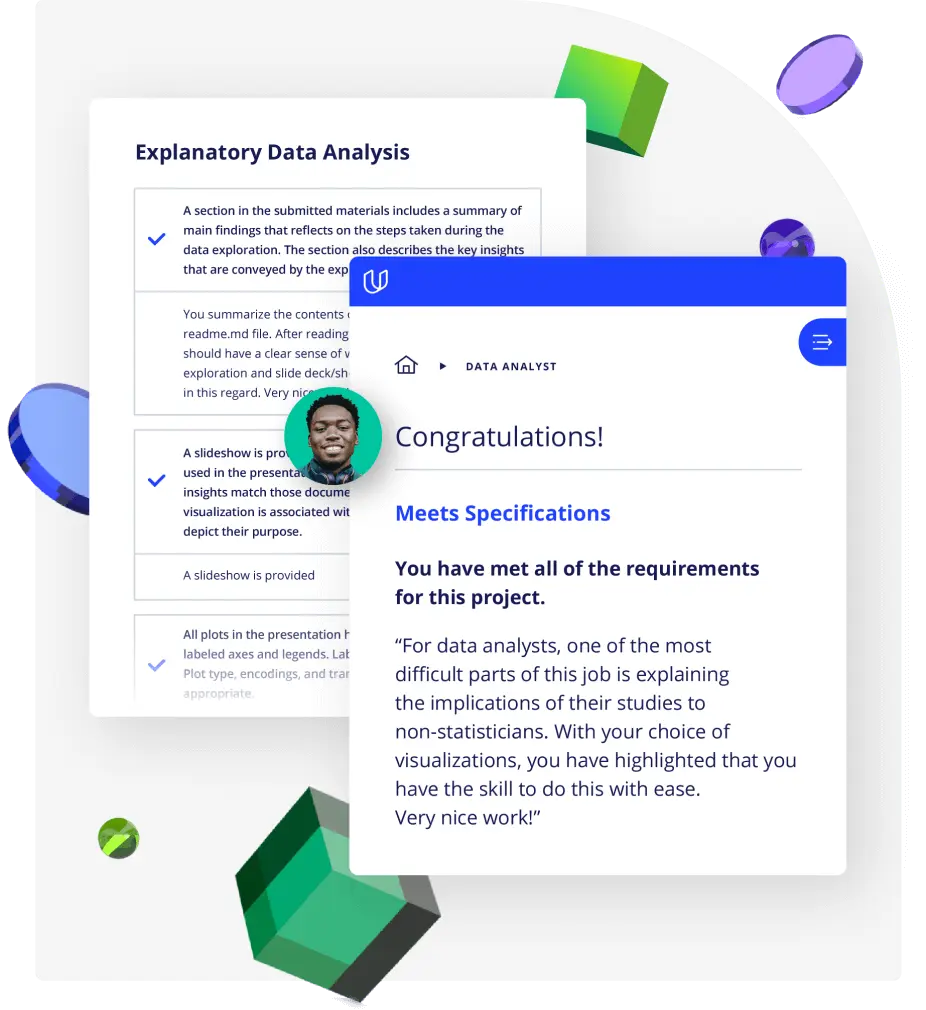
Demonstrate proficiency with practical projects
Projects are based on real-world scenarios and challenges, allowing you to apply the skills you learn to practical situations, while giving you real hands-on experience.
Gain proven experience
Retain knowledge longer
Apply new skills immediately
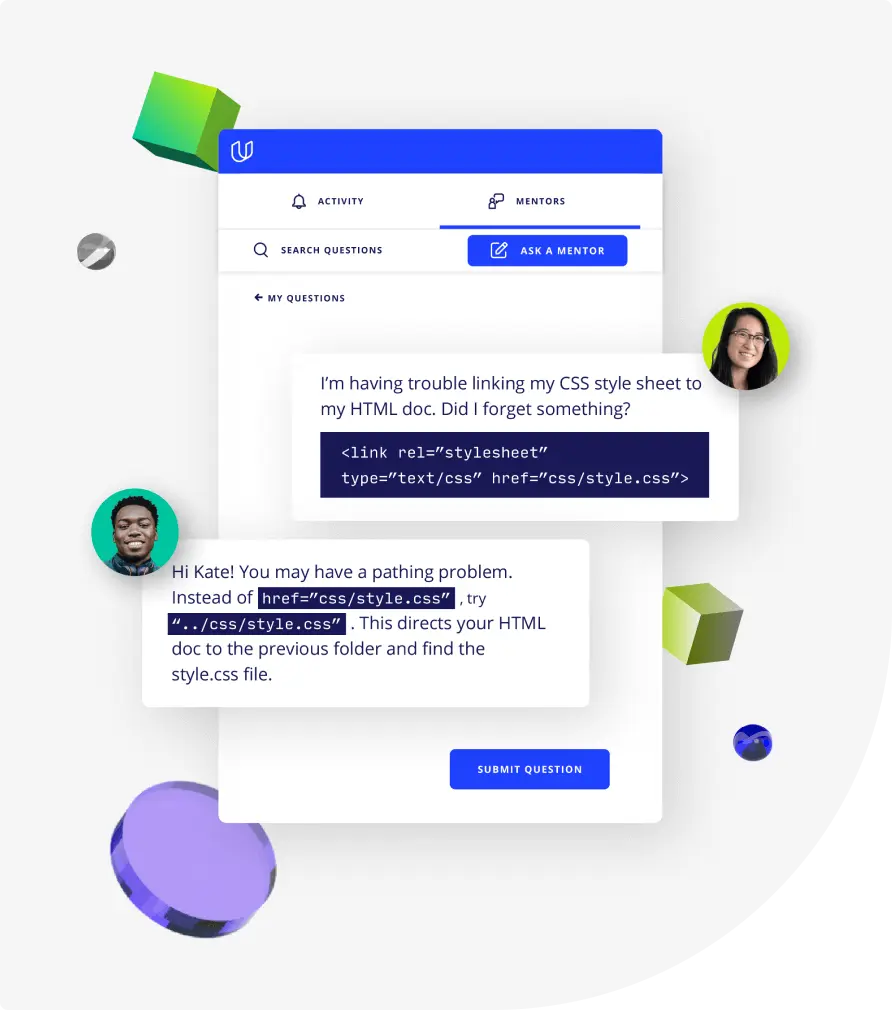
Top-tier services to ensure learner success
Reviewers provide timely and constructive feedback on your project submissions, highlighting areas of improvement and offering practical tips to enhance your work.
Get help from subject matter experts
Learn industry best practices
Gain valuable insights and improve your skills

Unlock access to AI for Healthcare and the rest of our best-in-class catalog
-
Unlimited access to our top-rated courses
-
Real-world projects
-
Personalized project reviews
-
Program certificates
-
Proven career outcomes
Full Catalog Access
One subscription opens up this course and our entire catalog of projects and skills.
Month-To-Month
4 Months
Average time to complete a Nanodegree program
Your subscription also includes:
Your subscription also includes:
3 weeks
, Advanced
(909)
4 months
, Intermediate
(450)
3 months
, Advanced
(496)
5 months
, Advanced
4 weeks
, Intermediate
(328)
2 months
, Advanced
(256)
2 months
, Intermediate
(81)
2 months
, Intermediate
4 months
, Intermediate
4 weeks
, Intermediate
(275)
2 months
, Advanced
(162)
3 months
, Advanced
(87)
4 months
, Advanced
1 month
, Intermediate
(235)
3 months
, Intermediate
7 hours
, Fluency

Get Started Today
AI for Healthcare
Month-To-Month
- Unlimited access to our top-rated courses
- Real-world projects
- Personalized project reviews
- Program certificates
- Proven career outcomes
4 Months
- All the same great benefits in our month-to-month plan
- Most cost-effective way to acquire a new set of skills
Related Programs
Related Programs
3 weeks
, Advanced
(909)
4 months
, Intermediate
(450)
3 months
, Advanced
(496)
5 months
, Advanced
4 weeks
, Intermediate
(328)
2 months
, Advanced
(256)
2 months
, Intermediate
(81)
2 months
, Intermediate
4 months
, Intermediate
4 weeks
, Intermediate
(275)
2 months
, Advanced
(162)
3 months
, Advanced
(87)
4 months
, Advanced
1 month
, Intermediate
(235)
3 months
, Intermediate
7 hours
, Fluency




